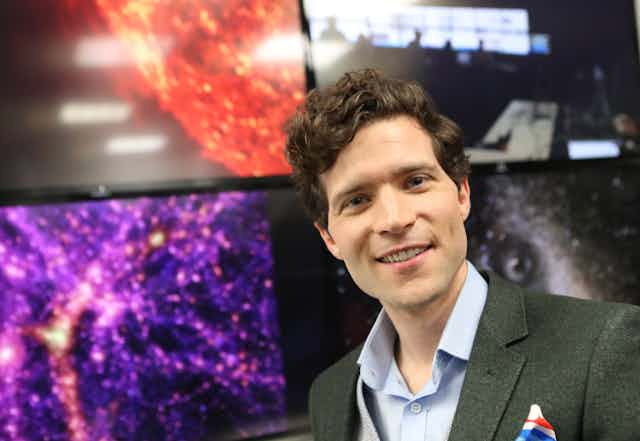From helping bees to a renewable energy future, Australian science was in the spotlight at the 2018 Australian Museum Eureka Prizes.
Professional researchers, school students and game developers were among the awardees on Wednesday night.
Alan Duffy from Swinburne University of Technology and The Royal Institution of Australia was awarded the Celestino Eureka Prize for Promoting Understanding of Science.
Duffy has a prominent career as both astrophysicist and science communicator, and uses simple analogies to help people understand complex science concepts. In articles for The Conversation, he has written about kitchen microwave rockets, the economics of galaxies, and vaccuum-cleaner planets.
The University of Sydney’s Nalini Joshi was awarded the University of Technology Sydney Eureka Prize for Outstanding Mentor of Young Researchers.
Joshi has mentored dozens of researchers over her career, and is also an advocate for gender equality in science. She initiated Science in Australia Gender Equity (SAGE), which strives to improve gender equity in STEMM research. Writing for The Conversation, Joshi has explained how to promote greater participation of women in senior levels of science, and described her experience as the first female professor of mathematics at the University of Sydney.
Australian National University researchers Andrew Blakers, Matthew Stocks and Bin Lu won the NSW Office of Environment and Heritage Eureka Prize for Environmental Research.
Specialising in renewable energy, their work has shown that Australia has the potential for a totally renewable electricity system, using cost-effective pumped hydro energy storage. Together, these researchers have also shared their expertise via The Conversation, explaining the pros and cons of locations for pumped hydro sites in Australia and Indonesia, and the future of renewable energy in Australia.
Also recognised at the 2018 Eureka prizes is QuestaGame, which won the Department of Industry, Innovation and Science Eureka Prize for Innovation in Citizen Science.
QuestaGame, developed by environmental experts and a large multidisciplinary team, combines gaming with learning about the environment and biodiversity. By finding and identifying species, players can earn rewards and compete against each other — all while contributing to real research.
Other winners included the researchers behind nanotech that can help you see in the dark, and a clock that is accurate to within one second over 40 million years.
Australia’s young and up-and-coming scientists are also featured in the Eureka Prizes.
Amelia Lai and Caitlyn Walker of the Presbyterian Ladies’ College in Sydney took home the University of Sydney Sleek Geeks Science Eureka Prize for primary school students. Their film Bee Aware and Care tells us about the importance of bees to our lives, the major threats they face, and how we can help protect these insects.
Ella and Emily Woods from St Margaret’s Anglican Girls School in Queensland won the University of Sydney Sleek Geeks Science Eureka Prize for secondary school students. Their film Gas Busters explains the science, history and solutions to the common ailment of lactose intolerance.
Adam Geiger won the Department of Industry, Innovation and Science Eureka Prize for Science Journalism for his documentary Can we Save the Reef.
Other 2018 prize winners included:
UNSW Eureka Prize for Excellence in Interdisciplinary Scientific Research: Optical Physics in Neuroscience, University of Queensland
Australian Infectious Diseases Research Centre Eureka Prize for Innovation in Medical Research: CF Air
ANSTO Eureka Prize for Innovative Use of Technology: Wendy Erber, Kathryn Fuller and Henry Hui, University of Western Australia
Macquarie University Eureka Prize for Outstanding Early Career Researcher: Mohsen Rahmani, Australian National University
Defence Science and Technology Eureka Prize for Outstanding Science in Safeguarding Australia: The Sapphire Clock Team
University of Technology Sydney Eureka Prize for Excellence in Data Science: Smart Infrastructure Team, CSIRO’s Data61
UNSW Eureka Prize for Scientific Research: Sally Dunwoodie, Victor Chang Cardiac Research Institute
3M Eureka Prize for Emerging Leader in Science: Elizabeth New, University of Sydney
CSIRO Eureka Prize for Leadership in Innovation and Science: Thomas Maschmeyer, University of Sydney
Australian Museum Research Institute Medal: Rebecca Johnson, Australian Museum

